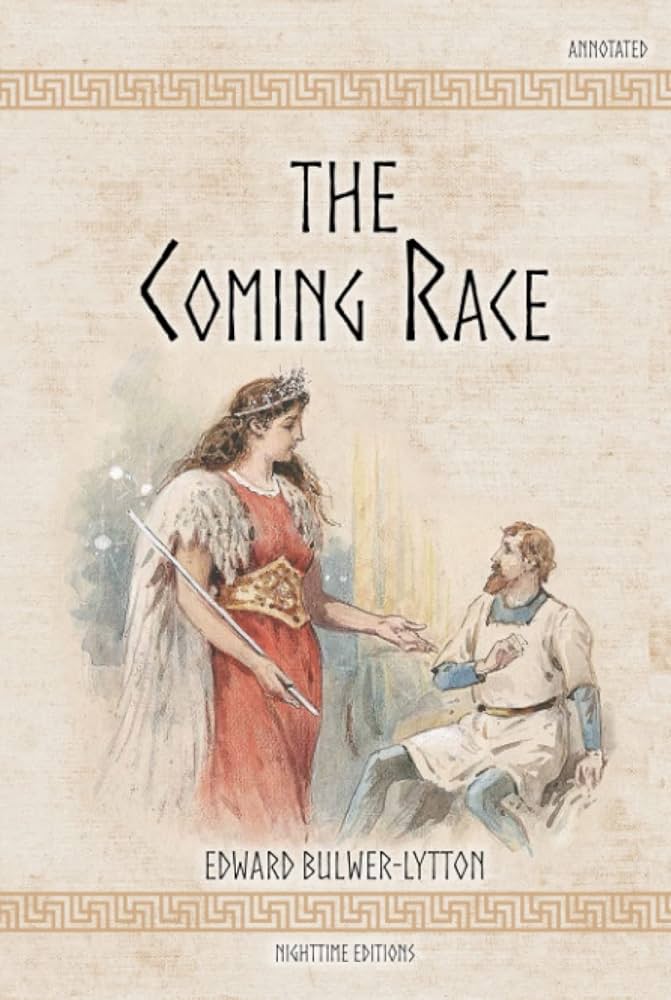Chapter XXIII — The coming Race
byChapter XXIII unfolds with a subtle tension, as the narrator grapples with an uncomfortable truth—Zee’s affection for him is both overt and socially acceptable in her world. Yet for him, it feels overwhelming and out of step with everything he has known. Her father, Aph-Lin, treats her interest casually, viewing it as a personal decision not requiring interference. This absence of paternal concern surprises the narrator, who comes from a culture where courtship is typically restrained and gender dynamics more passive. He senses danger in Zee’s boldness—not physical, but emotional and cultural. Despite her grace and intelligence, the difference in values makes closeness seem risky.
Their journey to Aph-Lin’s country estate offers little distraction from these thoughts. The residence, unlike any aboveground structure, merges biology and architecture into one living space. Its walls, a blend of transparent material and living trees, radiate peace. Inside, mechanical attendants perform tasks silently, while an indoor garden blooms beneath soft light. A luminous fountain, likely fueled by a chemical like naphtha, casts gentle reflections along the walls. It’s a place that invites serenity and contemplation. Yet to the narrator, its perfection feels alien, almost staged. He acknowledges its romantic potential but cannot ignore his discomfort with Zee’s dominant presence.
Over a quiet meal, Aph-Lin speaks of his civic role as Commissioner of Light. In their society, leadership is not enforced through power but earned through wisdom and trust. Rules are few, for behavior is guided by shared values, not coercion. There is no political ambition or party rivalry—governance functions more like stewardship. Wealth, where it exists, is seen as a burden that obligates the owner to contribute more to the common good. No one boasts of riches, and ostentation is frowned upon. The narrator finds this curious, especially given the ease with which status is flaunted in his own world. Here, humility isn’t preached—it is practiced.
The meal they share is entirely vegetarian, but rich and satisfying. Fruits unfamiliar to the narrator are combined with ground grains into nourishing forms. Even dairy substitutes are drawn from creatures unlike any on Earth, bred for milk and fiber but not for slaughter. No animal suffers for their nourishment, a principle that astonishes the narrator. Their culinary science has achieved balance—no meat, yet no nutritional lack. Health is not just maintained but optimized. There is little illness among the Vril-ya, and food is central to this wellness. Eating is not indulgence here; it is an extension of harmony.
Later, when Zee joins them, the tone shifts again. Her manner is direct, almost startling. With no hesitation, she declares her feelings to the narrator. In her world, such expressions are not taboo—they are expected. Yet to the narrator, it feels like an ambush. He is unprepared for a courtship that lacks subtlety or restraint. He declines her affection with as much care as possible, but his response causes her no visible distress. She takes rejection not as an insult, but as information. Her confidence remains untouched.
This experience lays bare the vast divide between their worlds. Among the Vril-ya, women are not only equals but often leaders—physically, intellectually, and socially. Their roles are not diminished, nor are they debated. They choose their partners, speak their minds, and operate with autonomy. The narrator is left unsettled, not by Zee’s affection, but by the cultural logic that supports it. In his world, such openness would be rare, even improper. Here, it is the norm.
As he prepares to rest that evening, the narrator reflects on all he has witnessed. The estate’s beauty, Aph-Lin’s civic philosophy, the quiet nobility of their diet—all impress him deeply. But the culture remains foreign in ways he cannot reconcile. He is not offended by the Vril-ya’s choices. He is simply unable to belong. Their peace, while admirable, comes with a kind of emotional discipline he cannot yet understand. In this moment, he begins to accept that coexistence is not the same as belonging. What he observes is more than a society—it is a worldview, complete in its own logic, and perhaps unreachable by his own.


